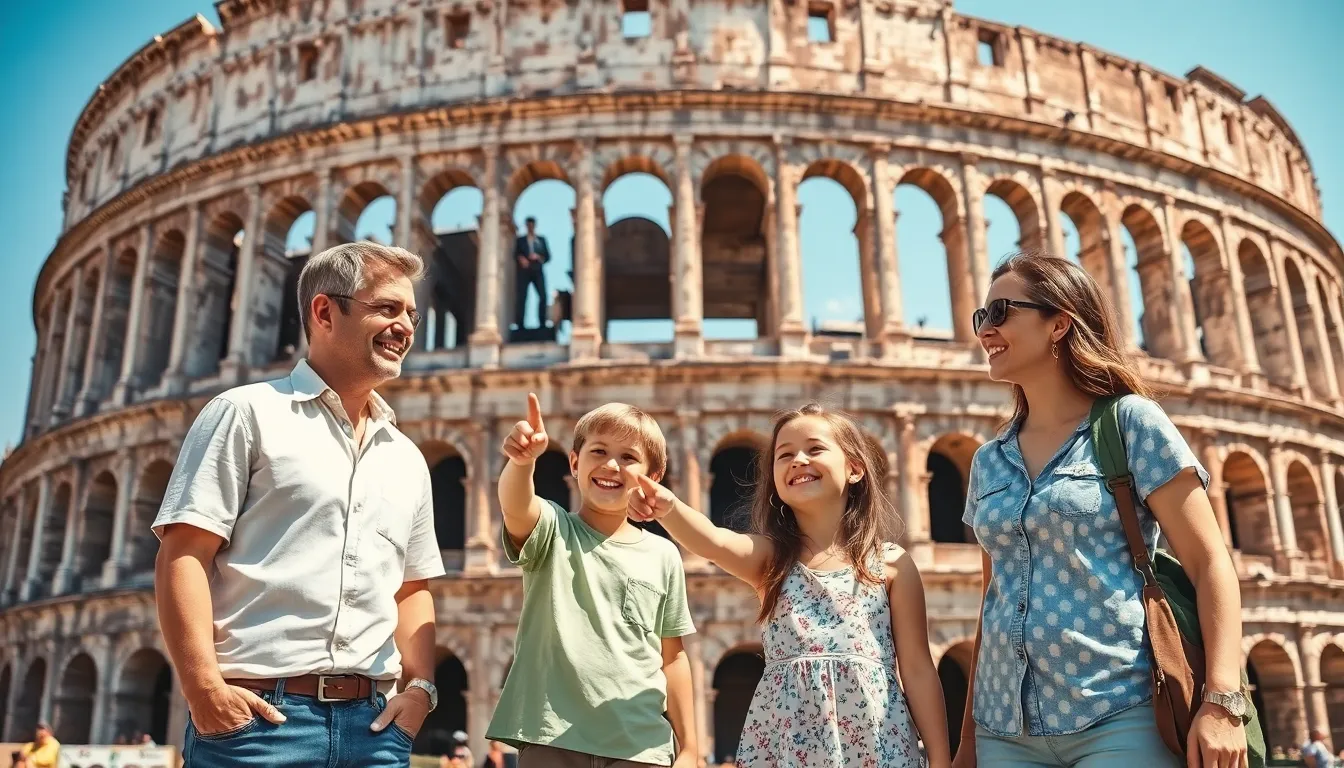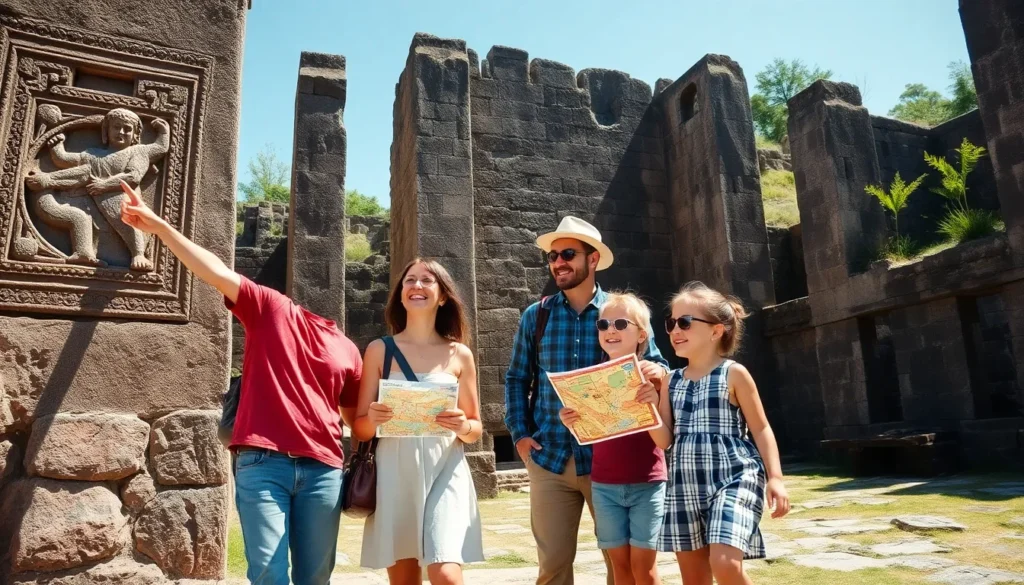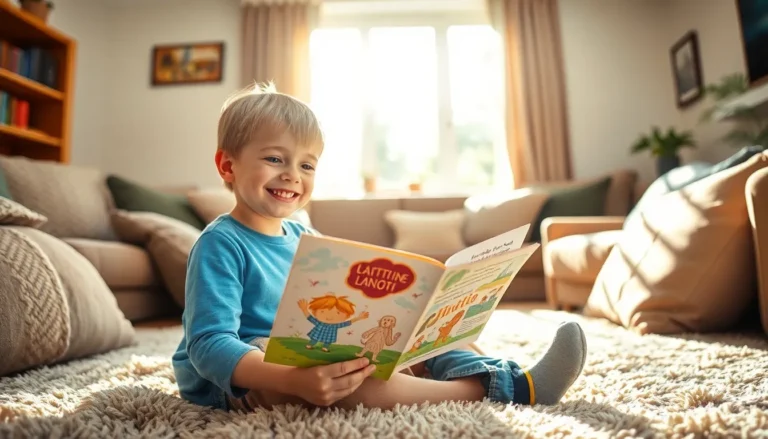Table of Contents
ToggleImagine swapping the usual family vacation for an adventure that sparks curiosity and ignites a passion for learning. Cultural trips offer families a chance to dive into the rich tapestry of history, art, and traditions that shape our world. Instead of just lounging by the pool, families can explore ancient ruins, savor exotic cuisines, and dance to the rhythms of local festivals. Who knew education could be so much fun?
Importance Of Cultural Trips For Families
Cultural trips provide rich experiences that enhance family bonds. Engaging with local history fosters a sense of shared learning and adventure. Families witness traditions, expanding their understanding of diverse cultures. Exploring historic sites cultivates curiosity in children, making them more inquisitive learners.
Participating in local festivals brings communities closer. Unique experiences such as cooking classes or dance workshops allow families to learn together. Discovering new cuisines broadens palates and introduces healthier eating habits. Forming connections with locals can lead to lasting memories and increased empathy.
Cultural immersion promotes open-mindedness. Families encounter perspectives differing from their own, enriching their worldview. These trips also encourage meaningful conversations between family members, nurturing relationships.
Traveling together creates a narrative that shapes a family’s identity. Different settings and environments spark creativity and inspire discussions. Families returning from cultural trips often demonstrate a deeper appreciation for global diversity.
Experiencing art and music in different contexts enhances cultural awareness. Observing craftsmanship at local markets or galleries highlights the importance of creativity in communities. Families that engage in cultural exploration tend to embrace innovation in their daily lives.
Cultural trips inspire lifelong learning. Immersing in different lifestyles can ignite interests that continue long after the trip concludes. Families find value in shared experiences, transforming the way they connect with one another.
Types Of Cultural Trips

Cultural trips can take various forms, allowing families to explore different aspects of society, history, and art. Engaging in these experiences offers unique opportunities for discovery and enrichment.
Historical Sites
Historical sites provide a direct connection to the past. Families can walk through ancient ruins, such as the Colosseum in Rome, or visit battlefields significant to local history. Each visit brings educational insights, making history tangible. Engaging with knowledgeable guides deepens understanding of historical contexts. Exploring archaeological sites often sparks curiosity in children, prompting questions about civilizations that came before them. Educational tours enhance this experience, offering structured learning in a captivating environment.
Art Museums
Art museums serve as windows to different cultures through artistic expressions. Families marvel at works from renowned artists like Van Gogh or Picasso. Viewing diverse styles and mediums can ignite conversations about creativity and interpretation. Interactive exhibits often engage younger audiences, inviting them to appreciate art hands-on. Participating in museum workshops or guided tours presents unique insights into art history and techniques. Discovering local artists during regional exhibitions helps families connect with the culture of the destination.
Festivals And Events
Festivals and events showcase vibrant cultural expressions that unite communities. Families can partake in local celebrations, such as the Dia de los Muertos in Mexico or the Lantern Festival in Taiwan. These experiences allow for the appreciation of traditional music, dance, and cuisine. Engaging with locals during festivals fosters connections and understanding. Participating in various activities, such as parades or cooking demonstrations, ensures memorable interactions. Observing the unique practices of different cultures can inspire families to further explore global diversity.
Planning A Cultural Trip
Planning a cultural trip requires careful consideration and strategy. Families should evaluate several factors to ensure a rewarding experience.
Choosing A Destination
Selecting the right destination is crucial for a successful cultural trip. Different destinations offer unique learning opportunities. Families can choose historical cities, vibrant art scenes, or regions famous for traditional festivals. Research local customs and typical activities in those areas. Local cuisine and community involvement enhance the cultural experience significantly. Families often benefit from prioritizing destinations known for rich educational content. Prioritize safety and accessibility when narrowing down options. Seek recommendations from travel resources or fellow families that have explored these regions.
Budgeting And Expenses
Budgeting for a cultural trip ensures that families maximize their experiences without financial strain. Create a comprehensive budget that includes accommodations, transportation, meals, and activity costs. Research local expenses to set realistic daily spending limits. Families can often save by booking flights and accommodations in advance. Utilize local public transportation to reduce travel costs. Attend free events or low-cost workshops in the area to immerse in the culture. Encourage the family to allocate a portion of their budget for unexpected opportunities or experiences that may arise during the trip.
Benefits Of Cultural Trips For Families
Cultural trips significantly enhance family experiences. They offer unique opportunities for education and bonding.
Educational Value
Educational value stands out in cultural trips. Families learn about history through direct experiences at ancient sites and museums. Engaging with knowledgeable guides deepens understanding of different cultures. Diverse cuisines introduce families to new flavors and culinary traditions. Participating in local arts fosters creativity and encourages hands-on learning. Workshops like cooking and dance allow families to explore cultural practices together. Exposure to various traditions cultivates curiosity in children, making them more inquisitive learners. Families return home with greater awareness of global diversity and appreciation for different perspectives. Such trips transform education from a passive activity to an immersive adventure.
Strengthening Family Bonds
Strengthening family bonds occurs naturally during cultural trips. Shared experiences enhance connections between family members. Traveling together leads to meaningful conversations and discovery. Families create lasting memories while exploring new environments and traditions. Participating in local festivals promotes teamwork and shared enjoyment. Cooking classes or group activities allow families to connect through collaboration. Open dialogues about experiences deepen relationships and understanding among family members. Learning together fosters empathy and appreciation for one another’s perspectives. Families often find that cultural trips spark creativity and inspire discussions long after they return home. These adventures shape a family’s identity and encourage a lifelong passion for exploration.
Cultural trips offer families a unique opportunity to bond while exploring the richness of diverse traditions and histories. These experiences not only foster curiosity but also enhance empathy and understanding among family members. By engaging in local customs and activities, families create lasting memories that shape their identity and inspire a passion for lifelong learning.
With thoughtful planning and a focus on meaningful experiences, families can transform their vacations into educational adventures. Embracing cultural exploration opens doors to new perspectives and enriches everyday life. Ultimately, these trips cultivate a deeper appreciation for global diversity, making every family journey a chance to learn and grow together.




